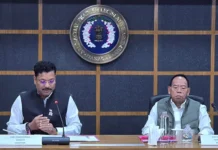ITANAGAR, 22 Oct: The Arunachal Pradesh State Human Rights Commission (APSHRC) has directed the state government to pay Rs. 2.50 lakh each to the families of the two employees of Tawang Electrical Division, who died due to electrocution on 17 October.
The commission observed that the fatal incident occurred due to gross negligence and violation of safety protocols by the authorities concerned, which resulted in the deaths of the two employees, Tenzin Lotey and Vikash Kumar.
Holding the state government responsible for violation of the victims’ fundamental right to life under Article 21 of the Constitution of India, the human rights organization stated that the workers engaged in maintenance of the 11 KV Tawang-Timilo-Changprong-Seru-Yusum feeder line were using an aluminum ladder without obtaining shutdown clearance from the control room.
“After a detailed inquiry and examination from the departmental enquiry reports, Department of Power, and the Superintendent of Police, Tawang, the Commission found systemic lapses, including the absence of posted electrical inspectors, failure to enforce safety standards, and administrative indifference despite repeated directives,” the Commission stated.
Citing the principles of strict and vicarious liability as laid down in the landmark cases, such as Rylands v. Fletcher (1868) and M.C. Mehta v. Union of India (1987), the Commission stated that the department of power, GoAP, is squarely liable for the deaths, as the state failed to provide a safe working environment for its employees.
The APSHRC directed the government to pay the compensation amount within five months and credit it specifically in favour of the children and dependents of the deceased for their education and welfare. It further directed the chief secretary to ensure timely implementation of the recommendation and to submit a compliance report to the Commission within five months.
The APSHRC stated that the incident reflects the urgent need for institutional reforms and enforcement of workplace safety protocols in all departments, especially those dealing with hazardous operations, to prevent such avoidable tragedies in future.


